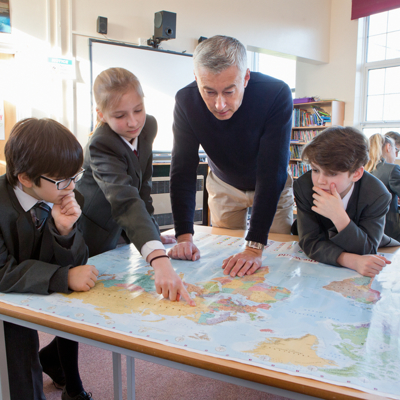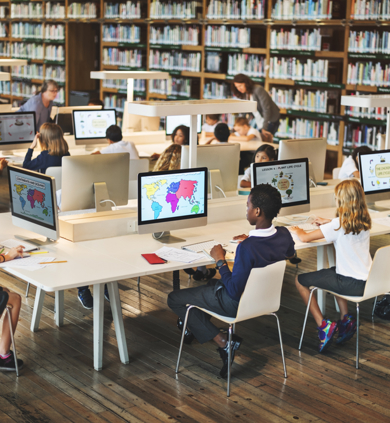Key Stage 3 Geography resources
Are you searching for captivating Key Stage 3 Geography resources that ignites a love of learning about our planet? Look no further!
Our interactive KS3 Geography resources are designed to spark curiosity and equip students (aged 11-14) with the knowledge and skills to become informed and responsible global citizens. Our content fosters critical thinking, problem-solving, and geographical inquiry, empowering students to navigate the complexities of our interconnected world.

Why choose our Key Stage 3 Geography resources?
Help your students on their journey to GCSE success with our KS3 Geography resources
Key features of our KS3 Geography resources
What's in Access' Key Stage 3 Geography curriculum?
Year 7
7.1 Places and skills
- What Are the Different Types of Geography?
- How Do You Use a Globe and an Atlas?
- What Are the World’s Main Physical Features?
- What Are the World’s Main Human Features?
- The Seven Wonders of the World - What and Where are They?
- How Do You Work Out Grid References?
- How Do You Show Height on Maps?
- How Do You Show Scale on Maps?
- Where Am I?
- What’s the Link Between Photos and Maps?
- Can You Plan and Follow a Route?
- What Is GIS?
7.2 Prisoners of Geography
- How Do We Understand the World Around Us?
- How Does Physical Geography Have an Impact on Place?
- Causes of Uneven Development - Africa
- How Has Geography Influenced the Development of China and India?
- How Has Geography Influenced the UK?
- Which Place Is Most Imprisoned by its Geography?
- The Brandt Line - Useful or Outdated?
- How Can You Map World Development?
- Is this Africa?
- What Links Africa and Star Wars?
- Evaluate the impact Star Wars Had on Matmata in Tunisia
- Should We Be More Optimistic About the World?
7.3 Weather and climate
- What Is the Difference Between Weather and Climate?
- Why Does it Rain?
- Depressions and Anticyclones
- What Is a Climate Graph and What do They Tell Us?
- What Is a Microclimate and What Influences it?
- Comparing Climates in the UK
- Does the UK Have Extreme Weather?
- Is UK Weather Becoming More Extreme?
- What Is he Greenhouse Effect?
- What Causes Climate Change?
- What Are the Impacts of Climate Change on the UK?
- What Can We Do About Climate Change?
Year 8
8.1 Rivers and coasts
- What Processes Are Happening at the Coast?
- What Erosional Landforms Do Waves Produce?
- What Depositional Landforms Do Waves Produce?
- How Can We Protect Our Coasts?
- The Lost Towns of Humberside - Where Did They Go?
- Why Are Coasts Areas of Conflict?
- What Processes Happen in Drainage Basins?
- What Processes Happen in Rivers?
- River Features in the Upper Course
- River Features in the Middle and Lower Course
- Why Do Rivers in the UK Flood?
- How Can We Manage Our Rivers?
8.2 Development
- How Do We Measure Development?
- What Does Global GNI Look Like?
- What Is the Global Pattern of Life Expectancy?
- Where Do the Happiest People Live?
- Why Are Some Countries More Developed than Others?
- What Are the Different Types of Aid?
- Is Aid Always a Good Thing?
- How Can We Close the Development Gap?
- The Story of a Chocolate Bar
- What Is ‘Fairtrade’ and How Does it Help?
- How Does Trade Keep Some Countries Rich and Others Poor?
- What Might Happen to World Development in the Future?
8.3 Extreme environments
- What Are the Main Biomes in Africa?
- Where Are the Hot Deserts in Africa and Why Are They there?
- What’s the Climate of the Namibian Desert Like?
- How Have Plants and Animals Adapted to Survive in the
Namibian Desert? - How Do People Use the Namibian Desert?
- Ecotourism in the Namibian Desert
- What Are the World’s Main Cold Ecosystems?
- Where Are the Cold Environments and Why are They there?
- What Plants and Animals Live in Northern Canada?
- Should We Drill for Oil and Gas in Northern Canada?
- What Does the Future Look Like for Northern Canada?
- What Are the Similarities and Differences between Hot Deserts and Cold Environments?
Year 9
9.1 Population and urban issues
- Where Do the People of the World Live?
- What Factors Affect Population Changes?
- What Is the Demographic Transition Model and What Does it Tell Us
- About a Place?
- What Is a Population Pyramid?
- Eight Billion People and Counting
- How and Why Did China control it’s Population?
- How Is Japan Dealing with an Aging Population?
- What is Rural to Urban Migration?
- Natural Increase - What Is it and How Is it Affecting Cities Across the World?
- The Issue of Urbanisation
- What Is Happening in Abu Dhabi?
- How Can We Ensure future Cities Are Sustainable?
9.2 Rocks and plate tectonics
- What Is the Structure of the Earth?
- How Do Plates Move?
- Alfred Wegener and Continental Drift
- Where are earthquakes found and how do they happen?
- What is a tsunami and how do they happen?
- What Happened in Japan in 2011?
- Why Was 1816 the Year Without a Summer?
- Are All Volcanoes the Same?
- What Happened in the 2002 Nyirganongo Eruption?
- Coping with Tectonic Hazards: HCs Vs. LICs
- Why Do People Live in Tectonically Active Areas?
- How Can We Manage Tectonic Hazards?
9.3 Globalisation
- How Are You Connected to the Rest of the World?
- What is Globalisation?
- Why Has Globalisation Happened?
- How Has the Internet Changed the World?
- Why Are Some Places Affected More by Globalisation than Others?
- The Global Fashion Industry
- The Story of Nike - is Nike an Ethical Company?
- A Fashion Victim
- Fast Fashion - Does this Make Things Worse?
- Is Globalisation a Good Thing?
- Problems with Globalisation
- What Does it Mean To Be a Global Citizen?
01
dd

 AU & NZ
AU & NZ
 SG
SG
 MY
MY
 US
US
 IE
IE




